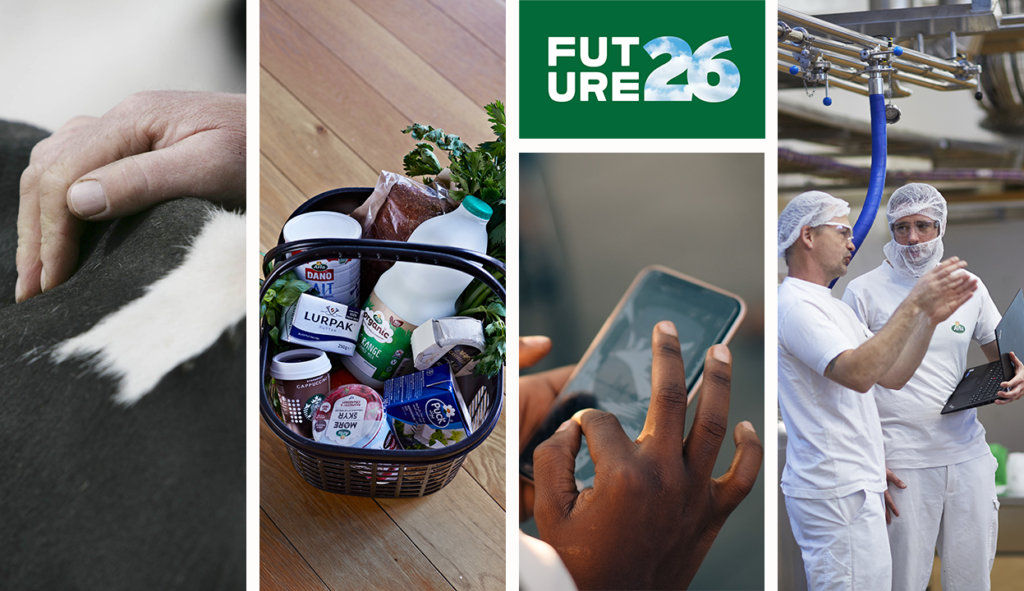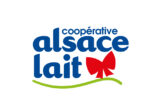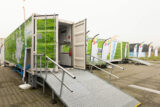Arla Foods today unveiled its new five-year strategy “FUTURE26”. It reaffirms its commitment to sustainable dairy production and responsible business growth. Over the next five years, Arla is prepared to increase its total investments by more than 40 per cent (vs. previous five years) to just over 4 billion euros. The investment focus will be on sustainability, digitalisation, new production technologies and product development. At the same time, Arla is increasing the annual supplementary payment to its cooperative farmers by 50 per cent, as already announced recently, to support them in their sustainability measures. In this country, Arla is among the top five in the dairy industry and has grown strongly in the brand business over the past five years with brands such as Arla Buko, Arla Bio, Arla Skyr and Kærgården. As the largest sales market in Europe, Germany also plays an important role in the “FUTURE26” strategy. In the German market, Arla Foods sees good, further growth opportunities, especially for its branded products. Around 1,570 German cooperative members supply their milk to two large Arla dairy plants in Rhineland-Palatinate and Mecklenburg-Western Pomerania.
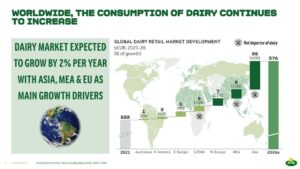 Demand for dairy products is increasing worldwide. At the same time, consumers are becoming more conscious about nutrition. They expect their food to be healthy, affordable and produced in a responsible and sustainable way. Over the next five years, the global market for dairy products is expected to grow by 2 per cent per year. In the Middle East, Africa and Asia-Pacific countries, growing populations will increase demand for dairy products. In Europe, dairy products have been an integral part of the diet for many years, but today consumers are increasingly looking for products that meet their needs in terms of health and wellness, convenience and sustainable production.
Demand for dairy products is increasing worldwide. At the same time, consumers are becoming more conscious about nutrition. They expect their food to be healthy, affordable and produced in a responsible and sustainable way. Over the next five years, the global market for dairy products is expected to grow by 2 per cent per year. In the Middle East, Africa and Asia-Pacific countries, growing populations will increase demand for dairy products. In Europe, dairy products have been an integral part of the diet for many years, but today consumers are increasingly looking for products that meet their needs in terms of health and wellness, convenience and sustainable production.
With its Good Growth 2020 strategy to date, Arla has achieved growth and leading positions in several countries as well as in product categories and in its global brands. On this basis and based on its global market outlook, Arla is ready to increase its total investments by more than 40 per cent to a total of just over 4 billion euros for the next five years. The focus will be on sustainability measures, product innovations, capacity expansions and digitalisation. At the same time, Arla wants to pay its farmers one of the most competitive milk prices in the industry. In addition, Arla recently adopted a new consolidation policy that provides for a higher, annual back payment to the 9,400 (1,570 in DE) cooperative members across Europe to support them in their sustainability measures. 1.5 euro cents additional payment instead of the current 1.0 euro cents per kilogramme of milk delivered is envisaged; provided that the company achieves an annual net profit of at least 2.8 per cent of turnover. The cooperative’s target range for net profit is basically 2.8 – 3.2 percent of turnover. The total amount envisaged for the supplementary payment on the volume of milk delivered by all cooperative Arla farmers is a good one billion euros in total for the next five years. In addition, the payment of the supplementary payment will now be spread over two instalments a year, in March and September, instead of once a year as before.
Leading the way in sustainable dairy
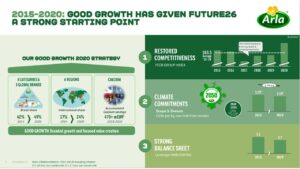 Over the next five years, Arla will continue to lead the way in data-driven, sustainable production of dairy products across the value chain. In addition, the dairy cooperative will strengthen its commitment to achieving the 1.5 degree target set out in the Paris Agreement. Over the past decades, Arla’s farmers have continuously worked towards sustainable agriculture. Today, they are among the most climate-efficient farmers. The average emissions per kilogram of milk are 1.15 kilograms of CO2e (CO2e=CO2 equivalent) including emissions from farmed anemic soils (peat soils). The cooperative members want to further reduce their greenhouse gas emissions in order to reach the science-based target of minus 30 percent in CO2e emissions per kilogram of milk by 2030. For Operations (total production and logistics), Arla has increased its reduction target: Greenhouse gas emissions (CO2e) in this area are now to be reduced by 63 per cent by 2030. To achieve this, the switch to green electricity and to a logistics fleet without fossil fuels is to be accelerated. In addition, all packaging is to be recyclable and even more plastics are to be replaced by fibre-based packaging solutions (e.g. paper-based).
Over the next five years, Arla will continue to lead the way in data-driven, sustainable production of dairy products across the value chain. In addition, the dairy cooperative will strengthen its commitment to achieving the 1.5 degree target set out in the Paris Agreement. Over the past decades, Arla’s farmers have continuously worked towards sustainable agriculture. Today, they are among the most climate-efficient farmers. The average emissions per kilogram of milk are 1.15 kilograms of CO2e (CO2e=CO2 equivalent) including emissions from farmed anemic soils (peat soils). The cooperative members want to further reduce their greenhouse gas emissions in order to reach the science-based target of minus 30 percent in CO2e emissions per kilogram of milk by 2030. For Operations (total production and logistics), Arla has increased its reduction target: Greenhouse gas emissions (CO2e) in this area are now to be reduced by 63 per cent by 2030. To achieve this, the switch to green electricity and to a logistics fleet without fossil fuels is to be accelerated. In addition, all packaging is to be recyclable and even more plastics are to be replaced by fibre-based packaging solutions (e.g. paper-based).
Creating value with FUTURE26
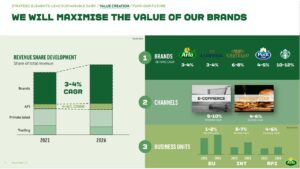 Under the previous Good Growth 2020 strategy, Arla has strengthened its position as a market leader in Northern Europe, the UK and the Middle East. In addition, the global brands Arla®, Lurpak, Puck, Castello and Starbucks have developed into strong and trusted brands. Over the next five years, Arla aims to leverage its key competitive advantage and further grow its brand business by three to four per cent per year. This will be achieved through investments in category innovation and development, new production technologies and facilities. In addition, Arla will invest in its global specialised business for high quality milk and whey ingredients – Arla Foods Ingredients (AFI) – to ensure best-in-class innovation as well as to develop new solutions for its partners. The newly opened innovation centre in West Jutland, Denmark, will be the driving force behind this.
Under the previous Good Growth 2020 strategy, Arla has strengthened its position as a market leader in Northern Europe, the UK and the Middle East. In addition, the global brands Arla®, Lurpak, Puck, Castello and Starbucks have developed into strong and trusted brands. Over the next five years, Arla aims to leverage its key competitive advantage and further grow its brand business by three to four per cent per year. This will be achieved through investments in category innovation and development, new production technologies and facilities. In addition, Arla will invest in its global specialised business for high quality milk and whey ingredients – Arla Foods Ingredients (AFI) – to ensure best-in-class innovation as well as to develop new solutions for its partners. The newly opened innovation centre in West Jutland, Denmark, will be the driving force behind this.
Arla has successfully expanded its export business into markets such as China, West Africa and South East Asia. There, consumer demand for affordable dairy products exceeds local production as well as local supply. With the FUTURE26 strategy, Arla will strengthen and expand its presence in these markets in product categories such as butter and cheese, organic products and infant nutrition.

